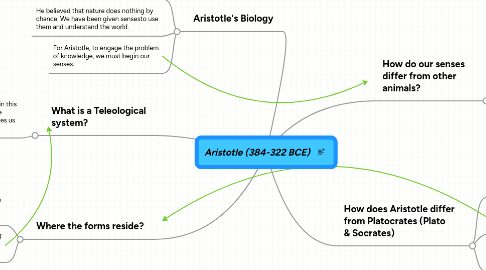Aristotle (384-322 BCE)
by Chris Berry


1. Aristotle's Biology
1.1. In his Metaphysics he believed that, "All men by nature desire to know. An example is the delight we take in our senses.
1.2. He believed that nature does nothing by chance. We have been given sensesto use them and understand the world.
1.3. For Aristotle, to engage the problem of knowledge, we must begin our senses.
2. What is a Teleological system?
2.1. Aristotle believed that everything in this world has causes (things that drive them to be created) and he provides us with four:
2.1.1. Material Cause: The material from which something is made.
2.1.2. Formal Cause: The shape or form a thing must take in order to be recognized.
2.1.3. Efficient Cause: The actual force used to amke the thing.
2.1.4. Final Cause: What is the ultimate pupose of the thing.
3. Where the forms reside?
3.1. Aristotle believed that the form lies within the things themsleves.
3.1.1. Ex: The form of an Oak Tree is in an acorn.
3.2. Each thing that we see is part of a teleological (goal oriented) system.
3.2.1. According to Aristotle; the human goal is to be a morally excelent person who has virtue
4. How do our senses differ from other animals?
4.1. All forms of life have three things in common:
4.1.1. Nutritive: the need to feed ourselves.
4.1.2. Reproductive: to pass on ones genes and to have offspring.
4.1.3. Locomotive Power: the ability to move.
